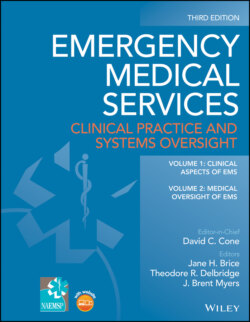Читать книгу Emergency Medical Services - Группа авторов - Страница 224
Role of emergency medical dispatch
ОглавлениеPrehospital care of the patient with a complaint of chest pain begins at emergency medical dispatch. Identification of patients suspected to have ACS allows an EMS system to send advanced level clinicians to the patient. Many EMS systems with both basic and advanced level ambulances use a trained emergency medical call taker who asks the caller a series of questions to determine the nature of the emergency and the likelihood that advanced level care will be needed (see Chapter 88).
A retrospective cohort study from England took a rigorous approach to determining the accuracy of one set of dispatcher questions in identifying patients with ACS [12]. Approximately 8% of calls at the “9‐9‐9” center were classified as “chest pain.” Subsequent chart review at the hospital identified all patients with the ultimate diagnosis of ACS and found that this represented only 0.6% of all 9‐9‐9 patients. Approximately 80% of the ACS patients were classified correctly as chest pain at the dispatch level. Another 7% were classified in a variety of other categories that still received a paramedic level response (e.g., severe respiratory distress). Sensitivity of the dispatch system for detecting ACS was 71% and specificity was 93%. However, a great deal of over‐triage occurred, and the positive predictive value of the dispatch system for detecting ACS was only 6%. Additional refinement of the dispatch question sequence to reduce over‐triage seems possible. The emergency dispatch question sequence for stroke performs much better, with a positive predictive value of 42% and a similar sensitivity to ACS at 83% [13].
Although an ACS patient can present with a variety of clinical symptoms, a study in Utah revealed that more than half of patients proven to have AMI complained of chest pain or a breathing complaint at the point of dispatch [14]. The percentage of AMIs significantly increased for patients aged 35 years and older and varied significantly by sex, dispatch level, and chief complaint.
The American Heart Association (AHA) and American College of Cardiology (ACC) recommend that emergency medical dispatchers prompt patients with nontraumatic chest pain to take aspirin if they have no contraindications while awaiting EMS arrival [15, 16]. This recommendation is based on extrapolation from data showing that patients who take aspirin before hospital arrival are less likely to die, and it is likely quite safe [17].
